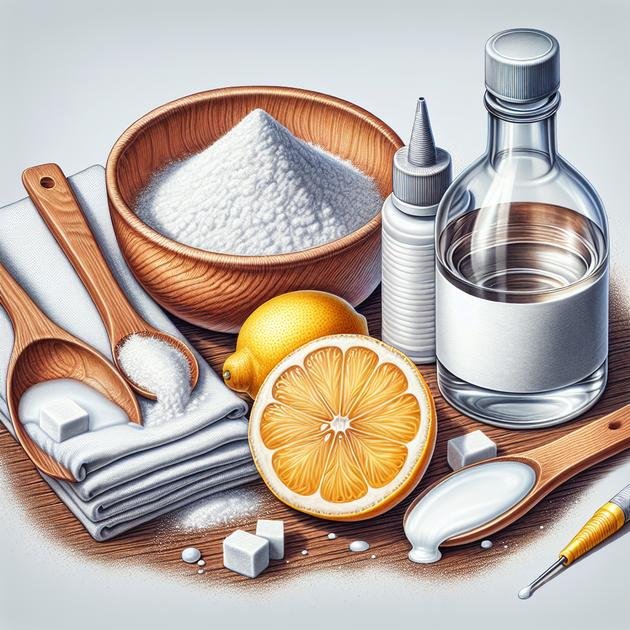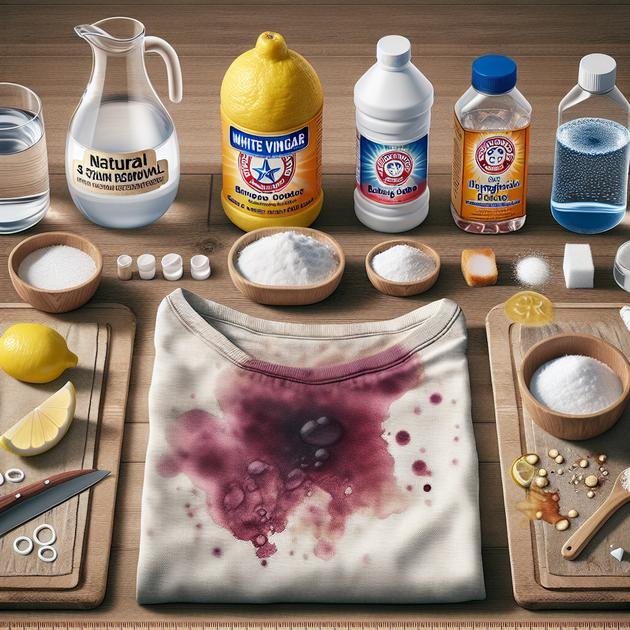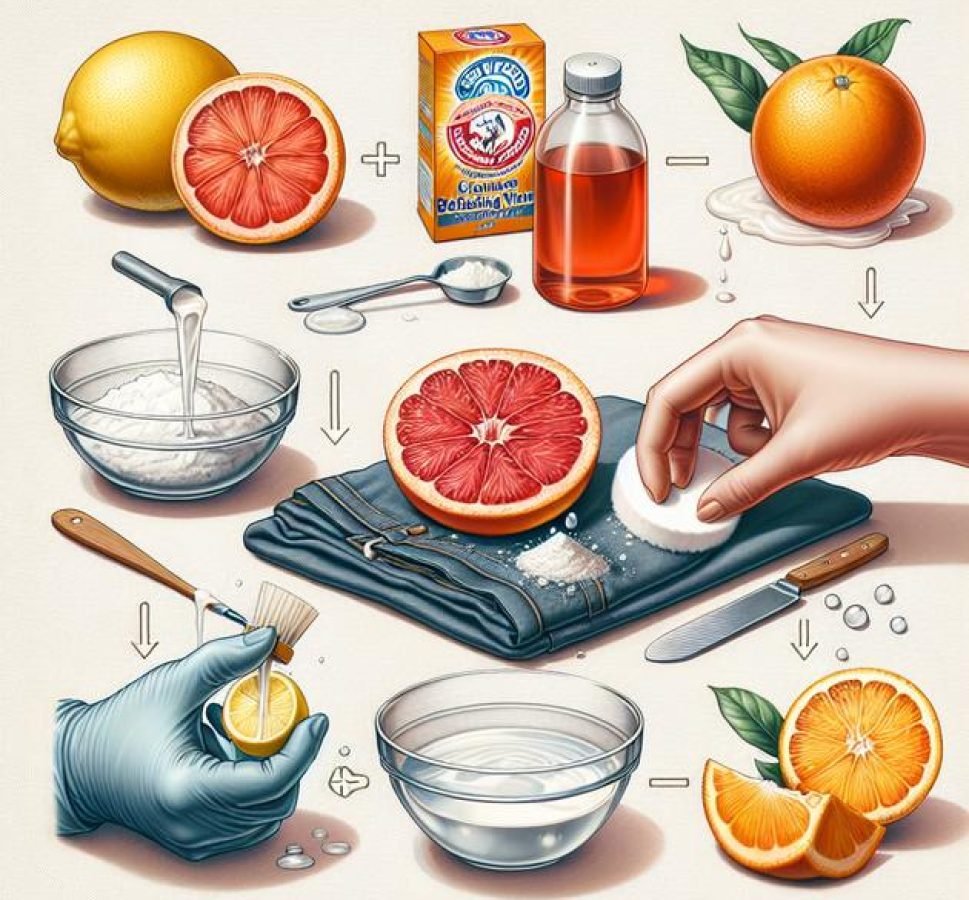Natural stain removers use common household ingredients like vinegar, baking soda, and lemon juice to safely and effectively remove stains while protecting fabrics, skin, and the environment.
Have you ever struggled with stains and wished for a safer, natural solution? Natural stain removers might surprise you with how well they work, using everyday ingredients around the house. Curious to see which ones really make a difference?
why choose natural stain removers
Choosing natural stain removers is not just about avoiding harsh chemicals; it’s also a step towards a healthier home and environment. Many conventional stain removal products contain synthetic compounds that can irritate skin and pollute water sources. Natural alternatives use ingredients like lemon juice, baking soda, and vinegar that are gentle yet effective.
These natural agents break down stains safely without damaging fabric fibers, making them suitable for delicate materials. Additionally, they are usually cost-effective and easy to find in your kitchen. Opting for natural stain removers also reduces your household’s chemical footprint, supporting sustainable and eco-friendly living.
Health benefits of natural stain removers
Since natural removers avoid toxic chemicals, they lower the risk of allergic reactions and respiratory issues, especially important in homes with children or pets. Using these substances can improve indoor air quality compared to synthetic cleaners.
Environmental impact
Natural ingredients biodegrade quickly and do not accumulate in ecosystems. This means fewer harmful residues in lakes or soil. Choosing natural solutions promotes a cleaner planet by reducing chemical runoff and pollution.
Ultimately, selecting natural stain removers combines effectiveness with safety for both your family and the environment, making it a smart choice for stain treatment at home.
common natural ingredients that remove stains
Several common natural ingredients are powerful when it comes to removing stains without harsh chemicals. One of the most popular is baking soda, which acts as a gentle abrasive and deodorizer, perfect for freshening stains while lifting dirt.
White vinegar is another versatile option. Its mild acidity breaks down many stains, from coffee to sweat marks, making it useful for soaking and rinsing fabrics. Lemon juice combines natural acidity with a bleaching effect when exposed to sunlight, great for whitening whites and fading darker stains.
Salt can be used to scrub away stains and prevent colors from bleeding, especially on fresh spills. Cornstarch works well to absorb oily and greasy stains before washing. Lastly, hydrogen peroxide is often used as a natural bleach alternative for tougher stains, but it should be tested on fabrics first to avoid discoloration.
How to combine these ingredients
Mixing baking soda with vinegar creates a fizzy reaction that can help push out stubborn stains. A paste made from lemon juice and salt can target stains on cotton and linen. Understanding the properties of each ingredient allows you to customize your stain removal approach safely and effectively.
Using these natural ingredients not only helps maintain fabric quality but also keeps your home free from toxic substances.
how to prepare your own stain remover at home

Creating your own natural stain remover at home is simple and cost-effective. Start by combining common household ingredients to tackle different types of stains. A basic recipe includes 1 cup of white vinegar, 1 cup of water, and 2 tablespoons of baking soda. Mix these gently to avoid excessive fizzing and store the solution in a spray bottle for easy use.
For grease stains, make a paste using baking soda and a small amount of water. Apply it directly to the stain and let it sit for 15 minutes before brushing it off. For protein-based stains like blood, use cold water with salt to soak the fabric first, then apply lemon juice before washing.
Step-by-step guide
1. Identify the stain type to select the right natural ingredients.
2. Prepare mixtures in small batches to ensure freshness.
3. Test the stain remover on a hidden fabric area to avoid damage.
4. Apply the solution or paste to the stain and let it sit for 10-15 minutes.
5. Gently blot or scrub the area depending on fabric sensitivity.
6. Wash as usual, either by hand or machine.
By customizing your homemade stain remover, you can handle most household stains safely and efficiently, keeping your clothes and environment healthier.
stain remover tips for different fabric types
Different fabric types require specific care when using stain removers to avoid damage. Natural fibers like cotton and linen are more durable and usually tolerate natural stain removers like vinegar and baking soda well. For these fabrics, you can apply the remover directly, but always test a small hidden area first.
Synthetic fabrics such as polyester or nylon need gentler treatment. Avoid using strong acids like lemon juice directly, as they may break down fibers over time. Instead, opt for a mild baking soda paste or diluted vinegar solutions with quick rinsing.
Delicate fabrics and special considerations
Silk, wool, and other delicate fabrics require extra caution. Use only gentle natural solutions, like a diluted mix of baking soda and water, and apply lightly. Avoid scrubbing to prevent fiber damage.
Always:
- Test stain removers on a hidden seam first.
- Apply stain removers cautiously to prevent spreading the stain.
- Use cold water for protein-based stains on delicate fabrics.
- Rinse thoroughly to remove residue which may weaken fabric.
By tailoring your approach, you can safely and effectively remove stains without harming your favorite clothes.
natural stain removers for tough stains like red wine and grease
For tough stains like red wine and grease, natural stain removers can be surprisingly effective when used correctly. Red wine stains respond well to salt, which absorbs the liquid if applied immediately. Afterward, dab the stain with lemon juice or white vinegar to gently break down the pigments.
Grease stains require a different approach. Baking soda is excellent at absorbing oils; sprinkle it generously on the stain and let it sit for 15-20 minutes before brushing off. For stubborn grease, combine baking soda with a few drops of liquid castile soap, then gently scrub the area.
Additional tips for persistent stains
Hydrogen peroxide can be a natural bleaching agent for white fabrics, especially on tough stains, but always test it on a hidden area first. For colorful fabrics, mix baking soda and vinegar to create a fizzing reaction that helps lift deep stains without harsh chemicals.
Effective stain removal steps:
- Act quickly to prevent setting.
- Choose the appropriate natural remover based on the stain type.
- Test on a small hidden patch first.
- Apply the natural cleaner and let it work before washing as usual.
Using these natural methods preserves fabric integrity while treating even the most challenging stains safely.
precautions and tests before using natural stain removers

Before using natural stain removers, it’s important to take precautions to avoid damaging your fabrics. Always perform a patch test by applying the remover to a small, hidden area of the garment. This helps check for any color changes or fabric weakening.
Use mild solutions, especially on delicate fabrics like silk and wool. Avoid mixing ingredients haphazardly without understanding their reactions. For example, combining vinegar and bleach creates harmful fumes.
Steps for safe use
1. Identify the fabric type and stain.
2. Select a suitable natural remover based on the stain.
3. Test the remover on a hidden spot and wait 10-15 minutes.
4. Look for any discoloration or damage.
5. If safe, apply remover to the stain gently.
6. Always rinse fabric thoroughly after treatment.
Taking these precautions protects your clothes and ensures the best results when using natural stain removers. It also helps preserve the fabric’s longevity and appearance.
eco-friendly stain removal and sustainability benefits
Using eco-friendly stain removers supports sustainability by reducing harmful chemicals released into the environment. Natural ingredients like vinegar, baking soda, and lemon juice biodegrade quickly and do not pollute water systems, unlike many commercial stain removers.
These natural options require less energy to produce and package, minimizing your carbon footprint. Choosing eco-friendly stain removal also reduces plastic waste, especially when DIY mixtures are stored in reusable containers.
Environmental and personal benefits
Eco-friendly stain removers are safe for sensitive skin and decrease exposure to toxic substances in your home. They promote a healthier lifestyle while protecting ecosystems by preventing chemical runoff into soil and waterways.
Making the switch to natural stain removers aligns with broader sustainable living goals. It fosters mindful consumption and encourages waste reduction practices that benefit both current and future generations.
myths and truths about natural stain removers
There are many myths and truths surrounding natural stain removers that can confuse users. One common myth is that natural stain removers aren’t effective compared to chemical products. In reality, many natural ingredients like vinegar and baking soda work well on a variety of stains, especially when treated promptly.
Another misconception is that natural stain removers are always safe for all fabrics. While they are gentler, some natural acids, like lemon juice, can bleach or damage delicate fabrics if applied without testing first.
Understanding effectiveness and safety
Truthfully, natural stain removers excel when you know which ingredients to use for specific stains and how to apply them properly. They are often safer for sensitive skin and the environment, unlike harsh chemical alternatives.
However, natural solutions might require more time or repeated applications to completely remove stubborn stains. Patience and correct use are key to success.
Separating myth from fact helps you make informed choices about stain removal, ensuring both your fabrics and health are protected.
Why natural stain removers are a smart choice
Natural stain removers provide safe and effective ways to tackle common stains without harsh chemicals. They protect your fabrics, skin, and the environment, making them a smart choice for everyday cleaning.
By understanding how to use ingredients like baking soda, vinegar, and lemon juice correctly, you can remove stains gently and efficiently. Remember to test solutions first and be patient for best results.
Choosing natural options supports a healthier home and a greener planet. With a little care, natural stain removers can help keep your clothes fresh and your conscience clear.





